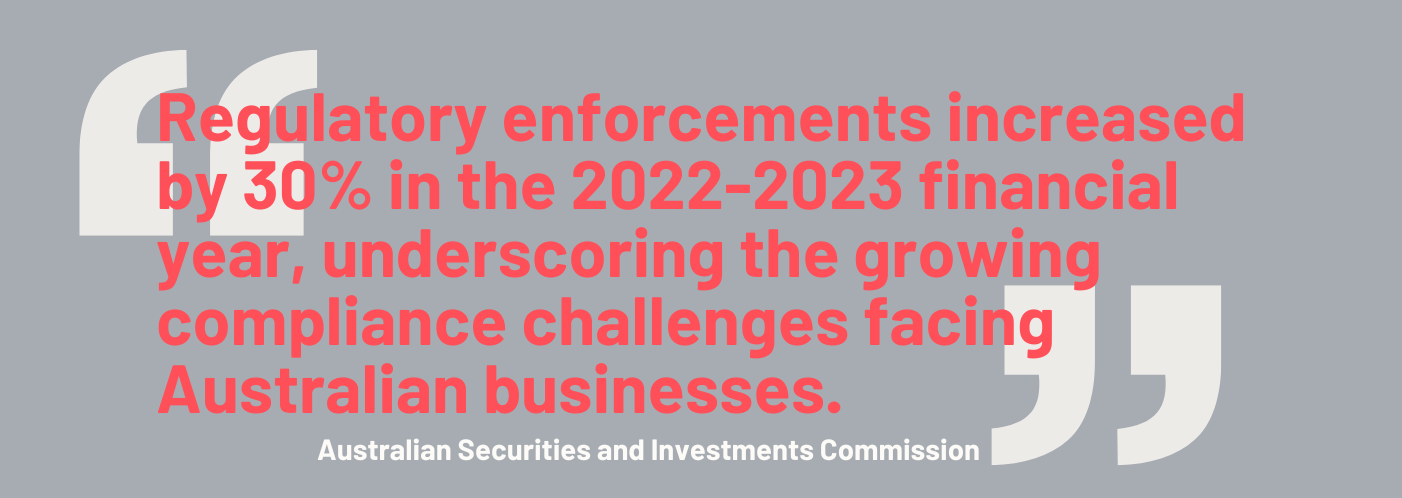Navigating Regulatory Changes: The Growing Importance of Compliance Officers in Australia
Australia has seen a significant increase in regulatory scrutiny across various sectors, from financial services to healthcare and technology. This shift has elevated the role of compliance officers from a back-office function to a critical component of executive leadership. Let's explore the evolving landscape of compliance in Australia and why compliance officers are becoming indispensable to Australian businesses.

The Changing Regulatory Landscape in Australia
Australia's regulatory environment has become increasingly complex:
- The Royal Commission into Misconduct in the Banking, Superannuation and Financial Services Industry led to sweeping reforms.
- New data privacy regulations, including changes to the Privacy Act, are reshaping how companies handle consumer data.
- Heightened focus on ESG (Environmental, Social, and Governance) reporting is driving new compliance requirements.
According to the Australian Securities and Investments Commission (ASIC), regulatory enforcements increased by 30% in the 2022-2023 financial year, underscoring the growing compliance challenges facing Australian businesses.
The Evolution of the Compliance Officer Role
Traditionally, compliance officers were often seen as 'rule enforcers'. Today, their role has expanded significantly:
- Strategic Advisor: Compliance officers now play a key role in strategic decision-making, helping to navigate regulatory risks.
- Change Agent: They drive cultural change, embedding compliance into the organisation's DNA.
- Innovation Facilitator: Modern compliance officers help businesses innovate within regulatory boundaries.
- Risk Manager: They're crucial in identifying, assessing, and mitigating regulatory and reputational risks.
- Ethical Compass: Compliance officers often serve as the ethical conscience of the organisation.

Compliance officers in Australia face a complex and evolving landscape of responsibilities. At the forefront is financial crime compliance, where officers must navigate intricate anti-money laundering and counter-terrorism financing regulations. Data privacy has become equally crucial, with officers working to ensure adherence to the Privacy Act while preparing for anticipated changes in data protection legislation. Corporate governance demands attention through the implementation of robust frameworks aligned with ASX principles, while cybersecurity compliance continues to grow in importance. The emergence of ESG reporting requirements adds another layer of complexity, and officers must also master industry-specific regulations across sectors like healthcare, finance, and telecommunications.
The investment in strong compliance leadership delivers tangible benefits to organisations. By implementing effective compliance measures, companies significantly reduce their exposure to regulatory breaches and resulting penalties. This commitment to compliance strengthens corporate reputation and builds stakeholder trust, while also providing a competitive edge, particularly in heavily regulated sectors. Well-structured compliance processes contribute to operational efficiency by eliminating redundancies and waste. Moreover, a deep understanding of regulatory frameworks often reveals new business opportunities, turning compliance into an enabler of innovation.
Australian compliance officers face several significant challenges in their roles. The increasing complexity of regulatory requirements demands constant attention and adaptation, while the integration of emerging technologies like AI and blockchain requires new approaches to compliance management. Many officers must balance these demands against limited resources and budgets. For those working in multinational organisations, managing compliance across different jurisdictions adds another layer of complexity. Internal challenges also exist, as officers often need to overcome organisational resistance to new compliance initiatives.
The modern compliance officer requires an extensive and diverse skill set to succeed. A foundation of legal and regulatory expertise must be complemented by strong business acumen to ensure compliance strategies align with organizational objectives. Technology proficiency has become essential, particularly in data analytics and compliance management systems. Strong communication skills enable officers to effectively convey complex regulatory requirements to various stakeholders, while change management expertise helps drive necessary organisational and cultural shifts. Ethical leadership remains fundamental, as officers must guide organisational decision-making with a strong moral compass. Finally, sophisticated risk assessment capabilities allow officers to identify and evaluate potential compliance issues before they become problems.

Organisations seeking to strengthen their compliance function must implement several key practices. Board-level representation ensures compliance maintains a strong voice at the highest organisational levels, while maintaining the independence of the compliance function prevents potential conflicts of interest. Adequate resource allocation and budget support are essential for implementing effective compliance initiatives.
Organisations must also invest in advanced compliance management and analytics tools to keep pace with technological advances. Supporting continuous education and training for compliance teams ensures they stay current with evolving requirements. Cross-functional integration between compliance and other business units creates a more cohesive approach, while promoting a culture of compliance ensures every employee understands their role in maintaining regulatory standards.
At Oceans Group, we have evolved our executive search approach to meet the increasing demand for exceptional compliance talent. Our strategy includes expanding the talent pool beyond traditional compliance backgrounds to identify leaders with diverse yet relevant experiences. We employ sophisticated assessment tools to evaluate candidates' ethical decision-making abilities and leadership potential. Our team provides clients with current insights regarding compliance trends and talent market dynamics. We assist organisations in developing comprehensive succession plans for critical compliance roles, and offer guidance for successfully integrating new compliance leaders into their organisations.
Looking to the future of compliance leadership in Australia, several significant trends are emerging. The integration of AI and machine learning in compliance monitoring and reporting continues to accelerate, while compliance strategies are shifting toward predictive approaches that anticipate and prevent issues before they arise. We're seeing greater integration of compliance functions with broader risk management initiatives across organisations. There's also movement toward more harmonised global compliance standards as businesses continue to operate across borders. Additionally, there's an increasing emphasis on compliance related to sustainability and ESG factors, reflecting growing stakeholder expectations in these areas.
Conclusion
The role of compliance officers in Australia has never been more critical. As regulatory complexities increase and stakeholder expectations evolve, compliance leaders are becoming key strategic partners in navigating the challenges and opportunities of the modern business landscape.
For Australian businesses, investing in strong compliance leadership is not just about avoiding risks—it's about building trust, driving innovation, and creating sustainable competitive advantage. The question is no longer whether robust compliance leadership is necessary, but how to most effectively integrate it into the core of business strategy and operations.
At Oceans Group, we're committed to helping Australian organisations find and develop the compliance leadership talent they need to thrive in this complex regulatory environment. Whether you're looking to strengthen your compliance function or advance your career in compliance leadership, understanding these trends and challenges is crucial for success. In an era where trust is currency and regulatory missteps can be costly, the right compliance leadership can be a game-changer. Is your organisation ready to elevate compliance to a strategic imperative?







